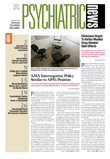It is dazzling to chair the Institute on Psychiatric Services in the year that it is being held in New york City. What glory for a Seattle boy who loves the Big Apple and would have loved to spend a year or two of my life there. This meeting will be a big one, not only because so many of our community-practice members live in, or close to, New york City, and not only because of the city's draw for the rest of us, but because we have a program that is cutting edge and relevant to your work.
When Pedro Ruiz, M.D., APA's incoming president, and I developed the theme for the institute, “Trauma and violence in Our Communities,” 9/11 was a painful memory no longer needing to be thrashed over once again at our meetings, and katrina had not yet happened. But the buzz about disasters had persisted, and we felt that there was a sense of danger in our communities and in our world. This year's institute captures that concern in a thousand different ways, as it affects our patients, especially those with severe psychiatric illness; ourselves; and the population at large. The lineup of lecturers will touch on aspects of this theme, as will many of the symposia and workshops. They will be interspersed with solid clinical presentations and a series of medical updates.
The institute is the home meeting of the American Association of Community Psychiatrists (AACP). Its program gives us inspiration and ideas that help our local programs and keeps us going another year. Do note the number of program items that are jointly sponsored by APA and the AACP.
In the spirit of community practice, APA has made this meeting welcoming to allied professionals. The American Orthopsychiatric Association will be offering a program element again this year, as will the Therapeutic Education Association, a regular at the institute. We are proud of the institute's large cross-professional attendance.
Recovery is a concept whose value is being increasingly appreciated throughout the treatment community, given the clear mandate for system transformation from the President's New Freedom Commission on Mental Health. Many speakers will be focusing on recovery, and we are sure that community psychiatrists will leave the institute with renewed enthusiasm for the concept.
Last year, Celebration Recovery, a consumer and family fair and celebration funded and organized by the Irwin Foundation, held one of its events at the institute. Many such celebrations have occurred all over the country in parks and halls in association with chapters of the National Alliance on Mental Illness or consumer groups. We had no idea how the event would turn out. About 200 psychiatrists came to Celebration Recovery, not having a clue what it was. It had all the magic of a 1960s “happening” —with a sense of fun, hopefulness, and creative energy reflected in a remarkable art exhibit, performances, and speeches. We estimated that nearly 600 consumers and their families came to Celebration Recovery. The amazement on their faces told the story of their appreciating what is truly meant by recovery.
Our own Michael Schwartz, M.D., Joan Clayton Ph.D., and their team from the Irwin Foundation are bringing Celebration Recovery to this year's institute. It will be bigger and more spectacular—a testament to the healing force of hope and positive expectations.
So come to this year's institute, go out on the town, and gather with friends and colleagues. It is often said that the institute is a friendly and intimate meeting, and that's not surprising—community psychiatrists know how to have fun. We are very embracing of all our psychiatric colleagues and will help them find the community psychiatrist within, yearning to be free!
I want to end by giving special thanks to Dr. Ruiz, who has been an inspiration to work with; Jay Scully, M.D., our APA medical director, who values the institute as a critical gathering for APA; and our lead staff person, Jill Gruber.
More information about this meeting, including the preliminary program, is posted at<www.psych.org/edu/ann_mtgs/ips/06/index.cfm>. The preliminary program may also be obtained by calling (888) 35-PSYCH. ▪
